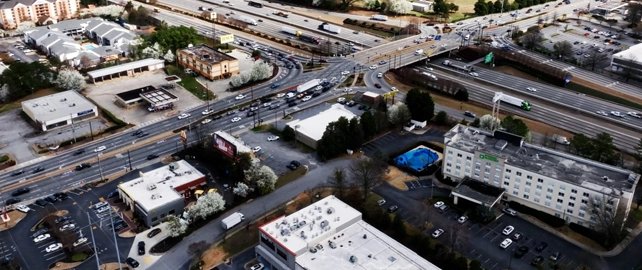Story
Upfront Gwinnett: The Hidden Homeless; Episode 2
Posted: December 13, 2024
Story Link: https://www.gwinnettcounty.com/web/gwinnett/home/stories/viewstory/-/story/the-hidden-homeless-episode-2
The Crisis Behind the Motels
Thousands of families in Gwinnett County are caught in a relentless cycle of housing instability. In the span of just a few months, rising rent prices, unexpected car troubles, or sudden expenses have forced families into extended stay motels. For many, it’s not just a temporary solution—it’s their new normal. And as rents continue to skyrocket, escaping this crisis is growing increasingly difficult.
While the daily struggles of these families often go unnoticed, experts warn that there are darker, more dangerous issues lurking. Human traffickers are targeting these vulnerable families, preying on their desperation.
Purity’s Story: A Struggle for Safety
Purity Muhammad, a mother of four, shared her story with Upfront Gwinnett in a previous episode. Living in an extended stay motel, Muhammad juggles working part-time while trying to make ends meet. But her story takes a terrifying turn when a stranger approaches her in the parking lot.
"He came up to me and asked where I was staying," she recalls. "I told him I didn’t know, and I had already called the police. I need you to back off. But instead, he punched me in the face."
Muhammad’s experience is just one example of the violence many families face. For her, the battle for freedom and safety is ongoing — but she holds on to hope, even through the darkest moments.
The Growing Dangers of Extended Stay Motels
While Muhammad fights for her family’s safety, experts like Attorney Patrick McDonough warn that extended stay motels have become breeding grounds for a much larger, insidious problem: human trafficking.
"Atlanta has become one of the largest hubs for sex trafficking, and Gwinnett is no exception," McDonough explains. "Some hotels, especially the lower-cost options, turn a blind eye, allowing traffickers to prey on vulnerable families." He leads the sex trafficking division of Andersen, Tate and Carr.
The rise of the internet has made trafficking easier than ever. McDonough describes a chilling shift: "In the past, if someone wanted to buy sex, they had to go to shady places in the city. Now, they can just select a victim online and drive to a motel to complete the transaction."
Holding Hotels Accountable
McDonough has dedicated his legal career to holding the hospitality industry accountable for enabling these dangerous operations.
"Hospitality businesses are being put on notice," he says. "If a motel is profiting from human trafficking, they can be held liable."
But McDonough stresses that it's not always easy to shut down these operations. "We found a federal statute that holds businesses accountable if they know or should know that trafficking is happening on their property. And that's where we’ve started targeting these motels."
Local Leaders Respond: A Call for Action
Gwinnett District 1 Commissioner Kirkland Carden is one of many local leaders stepping up to address this growing issue.
"The biggest challenge is that people don’t recognize the signs of trafficking," Carden says. "They don’t believe it’s happening here. But it is, and we need everyone—local organizations, stakeholders, and community members—working together to fight back."
The Cycle of Homelessness and Trafficking
The intersection of homelessness and human trafficking has become a dangerous cycle in Gwinnett. With few options for housing, families often end up in extended stays, where their vulnerability is exploited.
McDonough points out that many children in these motels end up in the foster care system, which exacerbates the problem. "Homeless children in these motels are often targeted by traffickers who know they are easy prey,” he said.
Organizations Fight Back: Providing Resources and Support
Despite the odds, organizations like SPARC are providing critical resources to help victims of both housing instability and human trafficking.
Joy Monroe of SPARC explains, "Extended stay motels are a hotspot for trafficking. Single mothers, often working two or three jobs, leave their children unsupervised, making them easy targets for predators."
The Road Ahead: Solutions in Action
While the problem is complex and far-reaching, efforts are being made to provide assistance. Local law enforcement and organizations are working together to combat human trafficking and homelessness.
Lt. Elbert Gurley of Gwinnett Police describes a typical winter scene: "We often find people standing in freezing temperatures, unsheltered. We approach them, offering help and transporting them to warming stations."
Meanwhile, Gwinnett Housing and Community Development has received over $6 million in funding from HUD to combat homelessness. "This is the most funding we've ever received to address homelessness, and it’s a critical step in providing resources for those in need," says Matt Elder of Gwinnett Housing.
The Hidden Homeless: A Continuing Crisis
The stories of families living in motels are heartbreaking, but they are also a call to action. The cycle of homelessness, housing instability, and human trafficking is a growing crisis that demands urgent attention. As experts, advocates, and local leaders work together, it is clear that breaking this cycle will require a coordinated, multi-faceted approach.
In the final episode, Upfront Gwinnett will continue to follow the efforts to provide sustainable housing and safety for those living on the edge. The fight against human trafficking, homelessness, and housing instability is far from over—but it’s a fight worth taking on.


